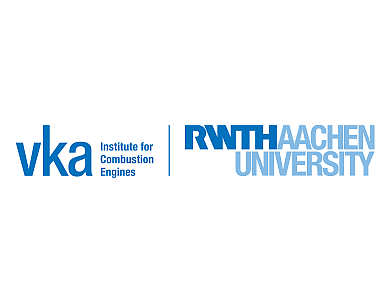The RWTH Aachen University (RWTH), established in 1870, is divided into nine faculties. Currently around 45,000 students are enrolled in over 150 academic programs. The number of foreign students (8556) substantiates the university´s international orientation. Every year, more than 6,000 graduates and 800 doctoral graduates leave the university. 539 professors as well as 5,894 academic and 2,750 non-academic colleagues work at RWTH University. The university budget amounts to 869 million Euros, of which nearly 337 million Euros are funded by third parties. Moreover, special field research, 27 graduate colleges, among them 15 founded by the German Research Foundation, 15 affiliated institutes with strong industrial alignment, 4 Fraunhofer institutes and 1 Leibniz institute illustrate the university´s considerable research potential.
- The Institute for Combustion Engines (VKA) of RWTH Aachen University – under direction of Prof. Dr.-Ing. Stefan Pischinger – and the Chair of Technical Thermodynamics (LTT) form the Institute for Thermodynamics, which is located within the Faculty of Mechanical Engineering of RWTH Aachen University.
At the Institute for Combustion Engines mainly fundamental research projects, but also applied research issues concerning the vehicle powertrain are elaborated. Research focuses on the investigation of flow analysis, fuel preparation and combustion with the purpose of energy saving and engine-related avoidance of emission generation as well as on exhaust gas aftertreatment with the help of catalysts and particle filters. Moreover, alternative fuels like natural gas, alcohol fuels and hydrogen with respect to their use in vehicles are examined. Further main areas are innovative engine designs, the examination of engine friction and of the acoustical behavior of combustion engines. In addition, actual research projects concentrate on hybrid powertrain concepts and fuel cell systems. The Center for Mobile Propulsion (CMP) supported by DFG (German research funding organization) provides a newly and worldwide unique testing center, where different testing facilities are connected and able to communicate via a fast real time network.
Particularly for this project, the institute’s experiences in single cylinder engine testing and combustion system development in combination with alternative bio-fuels comes into account. The usefulness of the applied tools, facilities and measurement techniques that are required to obtain the project goals has been demonstrated in previous projects already:- EU-218512, Bio-Ethanol engine for Advanced Urban Transport by Light Commercial Vehicle & Heavy DutY („BEAUTY“);
- EU-234032, POWERtrain for FUture Light-duty vehicles („POWERFUL“);
- AiF-16921, Diesel-Wasser-Mikroemulsionen („DWME“),
- Cluster of Excellence 236, Tailor-Made Fuels from Biomass („TMFB“).

Visit the Website
At the Institute for Combustion Engines of RWTH Aachen University we are dedicated to the development of sustainable mobility. Herein, a major task is to exploit the benefit of new fuels that are based on biomass and other renewable energy resources. Our recent fundamental experiments within our Cluster of Excellence “Tailor-Made Fuels from Biomass” revealed the great potential of fuels designed for high well-to-wheel efficiency as well as near-to-zero pollutant emissions. REDIFUEL provides the unique opportunity to transfer the experiences we gained from fundamental research into industrial application.





